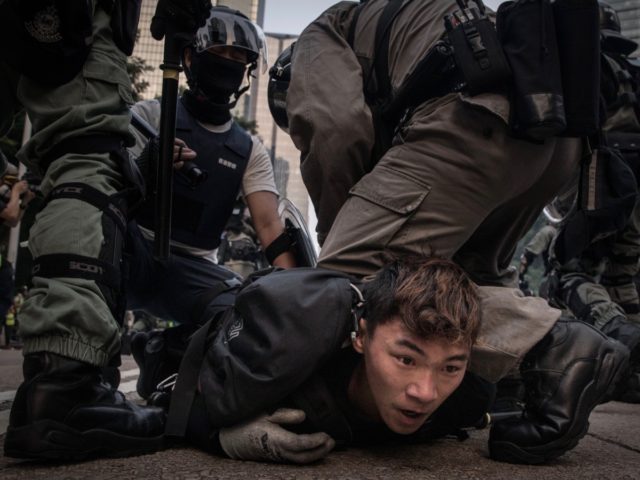The Chinese Communist Party (CCP) has “taken the world to the brink of a new Cold War” with Hong Kong serving as the new frontline in the fight between “freedom and autocracy”, the founder and chairman of Hong Kong Watch told Breitbart London.
On Tuesday, the dictator of the communist regime, Xi Jinping, signed the draconian national security legislation into law, meaning it will be added to the Basic Law of Hong Kong, the mini-constitution agreed to under the Sino-British Joint Declaration when the UK handed the city over to the Communist Party in 1997.
The national security law will criminalise anything that the CCP considers to be a subversion of the state, separatism, foreign interference, “or any acts that severely endanger national security”. It will also serve to clamp down on the pro-democracy protest movement and severely hamper freedom of speech in the city.
“Today is a watershed moment for Hong Kong’s future as an autonomous, open, and international city. Overnight, Beijing’s National Security Law will dismantle One Country, Two Systems and quash dissent through an extra-judicial cache of vague and draconian charges,” said Benedict Rogers of Hong Kong Watch.
“The Chinese Communist Party has taken the world to the brink of a new Cold War, not one of our choosing but one which, through their intensification of repression and aggression, this regime is inflicting on us,” Rogers told Breitbart London.
“Hong Kong is the new frontline in the fight between freedom and autocracy. It is essential now that democratic nations throughout the world unite and coordinate to deliver a clear message to Beijing, that it will not be allowed to get away with destroying Hong Kong’s liberties and autonomy,” he added.
Exclusive: ‘Freedom and Autonomy in Hong Kong is Dead’ Says HK Watch Founder https://t.co/Xksx9OY0pd
— Breitbart London (@BreitbartLondon) May 28, 2020
The last British Governor of Hong Kong, Lord Christopher Patten, said that the law “marks the end of one-country, two-systems”, adding that it is “a flagrant breach of the Sino-British Joint Declaration.”
“It will throttle the city’s rule of law, presenting a major confrontation between what passes for law in China and the common law system in Hong Kong which has allowed the city to function as one of the most important financial hubs in Asia. The separation of powers is in danger of being shattered and the courts politicised by the provision that the Chief Executive will herself choose the judges for national security cases,” Lord Patten warned, in a statement published by Hong Kong Watch.
Following the announcement that Chairman Xi signed the law, several leaders of the Hong Kong freedom party Demosisto, including Joshua Wong and Nathan Law, announced that they will be stepping down and disbanding the party out of fears of becoming a target of the new law.
“If my voice will not be heard soon, I hope that the international community will continue to speak up for Hong Kong and step up concrete efforts to defend our last bit of freedom,” Wong wrote.
[End of Hong Kong, Beginning of Reign of Terror]
1. #Beijing has just passed the sweeping #nationalsecuritylaw. It marks the end of Hong Kong that the world knew before. pic.twitter.com/QouY6Itr1O
— Joshua Wong 黃之鋒 😷 (@joshuawongcf) June 30, 2020
Writing in the Hong Kong Free Press on Tuesday, Hong Kong Watch founder Benedict Rogers called for a three-pronged approach to combat the authoritarian acts by the communist regime, saying the West must take “punitive, diplomatic and humanitarian” measures to save Hong Kong.
Rogers said that countries that have the ability to impose “Magnitsky-style sanctions” should impose them immediately on Chinese Communist Party members, saying that “the United States has led the way, and others must follow”.
The Hong Kong Watch chairman added that the British and other governments should say “no way” to allowing access to Huawei and other “Chinese technology companies complicit with the regime’s Orwellian surveillance systems and repression”.
Exclusive Video: Hong Kongers Protest in London Against ‘Gang Rape and Torture’ Committed by the CCP https://t.co/HCXanDcLCh
— Breitbart London (@BreitbartLondon) November 24, 2019
Rogers also said that the British government must lead the diplomatic efforts, calling for an alliance of Western powers alongside Asia-Pacific nations such as Japan, in which sanctions and other actions can be synchronised to have the most impact.
Finally, he argued that as a last resort, countries should adopt a lifeboat scheme to rescue Hong Kongers who need to flee the city.
“The aim in the global effort for Hong Kong is to create such pressure on the tyrants in Beijing that they back off and Hong Kongers can resume their lives as normal. But it would be naïve to fail to prepare. The tragedy is that it is highly likely that Hong Kongers — the number as yet unknown — may need sanctuary, and we should be ready,” Rogers wrote.
“No one country can take them all, obviously. That’s why a coordinated plan is needed. It has been done before, in past crises, and we must prepare to do it again,” Rogers urged.
Hand’s Off Hong Kong! Boris Johnson Warns China That UK Will Offer Path to Citizenship for 3 Million HK Citizens https://t.co/DPHldwMCte
— Breitbart London (@BreitbartLondon) June 3, 2020
Follow Kurt on Twitter at @KurtZindulka

COMMENTS
Please let us know if you're having issues with commenting.